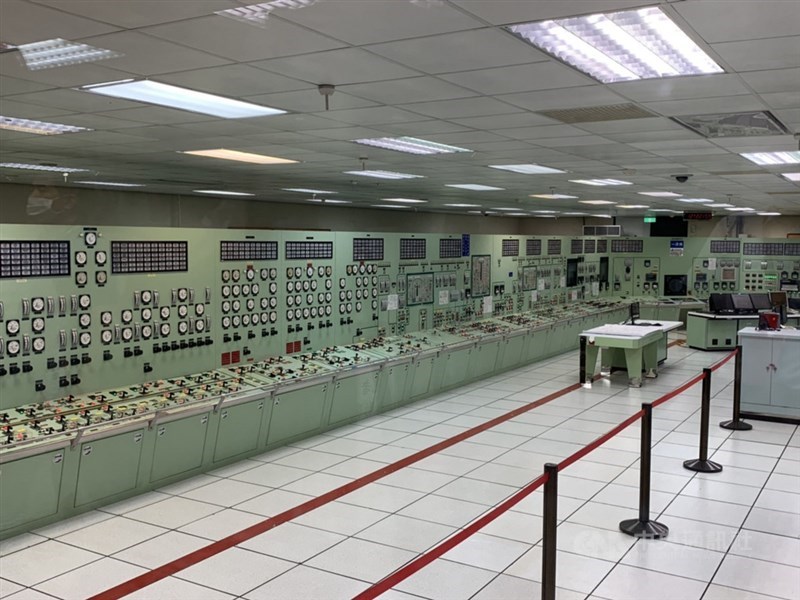
Taipei, Dec. 26 (CNA) Nuclear energy and its implications for climate change and grid stability emerged as a contentious topic in the second televised presentation of presidential candidates' policies in Taiwan on Tuesday.
During the presentation, ruling Democratic Progressive Party (DPP) nominee Lai Ching-te (賴清德) highlighted the party's efforts over the past eight years to transition to green energy to reach net zero by 2050 while also working towards the goal of a nuclear-free homeland by 2025.
Lai, the incumbent vice president, said that green energy accounted for 10 percent of Taiwan's total electricity generation as of last year, surpassing the 5 percent contribution from nuclear power.
"By continuing to promote the development of the green energy industry, we can undoubtedly effectively address the various challenges faced by industries under the impact of climate change," Lai said.
The DPP's objective of achieving a power mix of 20 percent renewable energy, 50 percent natural gas, and 30 percent coal by 2025 has faced criticism, including concerns an excessive reliance on fossil fuels will hinder carbon reduction efforts.
A series of significant power outages that occurred in the past few years has also heightened public concerns about the potential for an unstable power supply, particularly as Taiwan is in the process of decommissioning its existing nuclear power plants.
"The peak of Taiwan's power shortage was when former President Ma Ying-jeou (馬英九) handed over the power to President Tsai Ing-wen (蔡英文). Not long after that on May 30, 2016, the electricity operating reserve was only 1.64 percent," Lai said.
"The era of power shortages is behind us," Lai said, adding that state-run Taiwan Power Co. had managed to maintain a constant operating reserve of 10 to 15 percent.
Lai vowed to pursue a multifaceted expansion of green energy to ensure capacity is sufficient to meet the growing demand.
In addition, Lai said that the government would work on collaborating with the private sector to invest in energy storage facilities as well as establish smart grids and regional grids to bolster the resilience of the electricity supply.
Taiwan People's Party nominee Ko Wen-je (柯文哲), however, criticized the DPP for setting the goal of a nuclear-free homeland by 2025 without a comprehensive plan for energy transition.
Alluding to the convictions of several local officials involved in renewables projects, Ko said that wind and solar development in Taiwan had been beset by corruption.
The former Taipei mayor added that these shortcomings had been compounded by the DPP's approach to nuclear power, hindering the stable development of Taiwan's renewable energy industry.
Ko said he would extend the life of Nuclear Power Plant 2, which has begun decommissioning process in 2021, and delay the decommissioning of Nuclear Power Plant 3 if elected, and also carry out a prompt feasibility study into the operations of the unfinished and currently mothballed Nuclear Power Plant 4.
According to Ko, this approach is in line with the international trend that sees nuclear power play a bigger role in addressing the climate change challenge.
"We need to approach nuclear energy with a more pragmatic attitude and avoid treating the idea of a nuclear-free homeland as an ideology," Ko said.
The Kuomintang's (KMT) Hou Yu-ih (侯友宜), meanwhile, said that the DPP's nuclear energy policy "runs counter to international trends," citing the recent declaration by over 20 countries to triple nuclear energy capacity to achieve global net-zero greenhouse gas emissions by 2050.
The fact that the DPP's energy mix relies heavily on coal has posed health risks to the public, proven by the increases in lung cancer cases in Taiwan, and has resulted in a significant lag in its carbon reduction achievements compared to other countries, Hou added.
- Culture
Taipei's Fubon museum featuring renowned collections and artworks opens
05/04/2024 10:13 PM - Culture
European Day event in Taipei celebrates 'unity in diversity'
05/04/2024 08:30 PM - Business
MediaTek chair touches on semiconductor innovation in award ceremony
05/04/2024 08:04 PM - Culture
Taiwanese director wins award at Hot Docs Festival
05/04/2024 07:51 PM - Society
Lai inauguration banquet to highlight Taiwan's culinary expertise: Organizer
05/04/2024 07:31 PM
